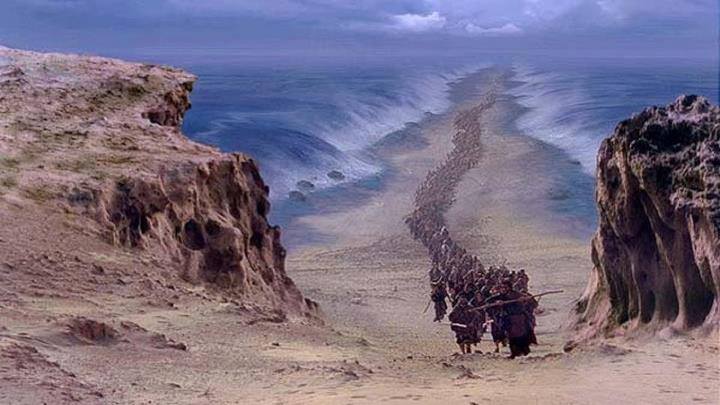Celebrate Passover with Tabernacle of David
Shalom, Tabernaclers! Judah here to let you know that Passover is coming up the first week of April, and you’re invited to join us:
- What: Passover with haggadah (retelling and teaching) and a full seder meal.
- When: Shabbat, April 4th, 11am.
- Where: Tabernacle of David, 1512 Woodhill Road, Burnsville MN
We’d be honored if you joined us. We’ll be celebrating God’s deliverance in the Exodus and remembering Messiah, our spotless Passover lamb, as we eat the matzah and retell God’s deliverance and saving power.
Plan on attending? Please purchase your tickets: $20/adult, $10/child to attend — this covers the cost of the catered meal. (If you wish to attend but have difficulty with the cost, please reply to this email and we’ll cover it.)
Passover is perhaps the most important feast of the Lord: it’s filled with a rich history of divine deliverance, its effects evident throughout the Scriptures, upheld and strengthened by Yeshua our Messiah, who bundled with Passover a new Messianic command. The feast was kept by the disciples, and Paul in his letters exhorted believers to keep Passover. The feast is full of themes of the Messianic Era and hints at a future fulfillment that will dwarf even the great miracles of Exodus.
Passover: Divine deliverance, generational blessings

Passover remembers the exodus from Egypt: a grand event in which God saves a group of nobodies — slaves being worked to death and absorbed into a pagan nation — baring his arm out of heaven, demonstrating repeated miracles in front of believer and unbeliever alike, delivering the Hebrews from slavery to a nationhood that produced the Scriptures, the prophets, and the Messiah.
God does because the slaves are none other than the sons of Abraham, the man who was deemed righteous by God because of his trusting, to whom God promised, “I will make of you a great nation and will bless you. I will make your name respected, and you will be a blessing.”
This great deliverance of Abraham’s family had lasting effects on the Scriptures, its signature found even on the 10 Commandments which begin, “I am the Lord your God who brought you out of the land of Egypt, out of slavery“, as if to remind Israel and the billions of believers generations later that Yahweh, the God of Israel, is the one who saves and delivers.
God reminds us that he is the deliver. He then commands us to tell about this deliverance to our children:
“When your children ask you, ‘What are you doing in this ceremony?’ say, “It is the sacrifice of Yahweh’s Passover, because Yahweh passed over the houses of the people of Israel in Egypt…”
Why does God command us to tell our children about Passover? Perhaps because it is through our remembering, our recounting, and our retelling of God’s works — every year, no matter where we live — that God’s deliverance is made reality for our children. These are not merely nice stories; they are history-changing events that resulted in the Scriptures, the prophets, the Messiah, and the precious land of Israel that God promised so long ago to Avraham.
These things become real to our children when we celebrate the Passover.
A Messianic Strengthening of Passover
 Passover has, in the last few decades, been a wonderful introduction for Christians to the feasts of the Lord and to the goodness of Torah. (Yes, invite your Christian friends to celebrate Passover – it’s a unique opportunity where Christians have an open door to the feasts.)
Passover has, in the last few decades, been a wonderful introduction for Christians to the feasts of the Lord and to the goodness of Torah. (Yes, invite your Christian friends to celebrate Passover – it’s a unique opportunity where Christians have an open door to the feasts.)
And no wonder the open door: Passover is all over the gospels.
• Yeshua says he eagerly desired to eat the Passover with his disciples.
• Yeshua drinks the traditional Passover cups.
• Yeshua eats the Passover matzah, as commanded in the Torah.
• Yeshua likens the Passover matzah to his body, and likens the wine to his blood, the blood of the New Covenant.
• Yeshua commands his disciples — including us today — to keep Passover in remembrance of him.
The reality that Yeshua upheld and strengthened Passover should come as no surprise; the themes of Israel’s deliverance are intertwined with the coming and return of the Messiah, Israel’s own future deliverance and resurrection life hinging on their acceptance of “Baruch haba bashem Adonai!”
Even after Messiah’s death, resurrection, and ascension from the Mount of Olives, we see the disciples still keeping the Feasts in Acts 2, celebrating Shavu’ot, the feast marked off as weeks from Passover.
Paul, too, in his letter to the Corinthians tells the gentile believers, “Clean out the old leaven [a Torah commandment on Passover], for you are to be as matzah (unleavened bread). So, let us keep the Feast, for Messiah, our Passover lamb, has been sacrificed.”
With the coming of Messiah, the meaning of Passover is amplified: we remember and retell God’s miraculous deliverance of Israel, and we strengthen it through remembering Messiah’s deliverance from sin, the merit of Yeshua through his unleavened life, death, and resurrection, and his blood, the blood of the New Covenant, promising greater things still.
Passover, a greater future exodus, and the Messianic Age

Messiah commanded us to remember him as we eat the matzah and drink the wine of Passover. The final cup at Passover, Messiah told, symbolizes the New Covenant. This is the cup which Messiah said he would not drink until it finds fullness in the coming Messianic Age.
This Messianic Age, the Kingdom of Heaven, is the core message of the gospels; Yeshua’s message of repentance was tied to this Kingdom, his parables unveiled the mysteries of this Kingdom, and his ministry aligned with its goals.
The Messianic Age is tied to Passover. The promises of God foreshadowed in Passover and the Exodus will play out before our eyes on a world stage that will witness a greater exodus in which God will gather all of his people from around the earth to himself in Jerusalem. The Hebrew Bible prophesies of this future exodus like this: that it will be such a grand event, people will no longer speak of the Exodus from Egypt.
The Messianic Era will record a final deliverance in which the Adversary will be sealed away, unable to deceive the nations any longer. The Messianic Era will see a great judgment on the enemies of God, dwarfing the plagues on the gods of Egypt. The Messianic Age, like Passover, will produce justice and nationhood for all of God’s people, only this time Messiah will reign as the world’s only King over us, making good on his honorific, prophetic name, Immanuel.
This new nationhood for God’s people will be fully realized as an Israel renewed from heaven: it will be the glorious consummation of the things of God at the end of the Messianic Age when God creates for us a new heavens, a new earth, and a new Jerusalem.
All of these things are foreshadowed, rehearsed, and remembered in Passover. I’m certain you’ll be celebrating Passover when the King returns, so won’t you join us celebrating Passover now, in 2015? I hope you will!
Thanks for reading,
-Judah

